|
|
|
Sort Order |
|
|
|
Items / Page
|
|
|
|
|
|
|
| Srl | Item |
| 1 |
ID:
073681
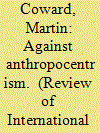

|
|
|
|
|
| Publication |
2006.
|
| Summary/Abstract |
This article examines the nature of the destruction of built environments. Such destruction should be seen as a distinct form of violence: urbicide. This violence comprises the destruction of shared spatiality which is the condition of possibility of heterogeneous communities. Urbicide, insofar as it is a destruction of heterogeneity in general, is thus a manifestation of a 'politics of exclusion'. However, this account of the destruction of the built environment is not only an insight into a distinct form of political violence. Rather, an account of urbicide also offers a metatheoretical argument regarding the scholarly study of political violence: namely that destruction of built environments contests the anthropocentric frame that usually dominates the study of violence.
|
|
|
|
|
|
|
|
|
|
|
|
|
|
|
|
| 2 |
ID:
073683
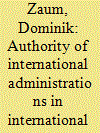

|
|
|
|
|
| Publication |
2006.
|
| Summary/Abstract |
This article analyses the way in which international administrations exercising governmental power in post-conflict territories justify their political authority in the absence of democratic legitimacy. Looking at the administrations in Bosnia, Kosovo, and East Timor, the article focuses on their establishment, their mandates, and their government practices and identifies five different sources of authority: consent, delegation, the maintenance of peace and security, the promotion of human rights and democracy, and the provision of government. However, all of these sources are contested. In particular the practices of international administrations, their lack of accountability and their limited effectiveness in providing government, undermine their authority. The article concludes by highlighting some possible avenues for enhancing the authority of international administrations.
|
|
|
|
|
|
|
|
|
|
|
|
|
|
|
|
| 3 |
ID:
073684
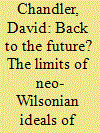

|
|
|
|
|
| Publication |
2006.
|
| Summary/Abstract |
International state-building has become central to international policy concerns and has marked a clear neo-Wilsonian shift in international thinking, spurred by the leadership of the United States and the European Union. Today's approaches insist on the regulatory role of international institutions and downplay the importance of locally-derived political solutions. This privileging of 'governance' over 'government' is based on the assumption that the political process can be externally influenced through the promotion of institutional changes introduced at the state level and pays less attention to how societal pressures and demands are constitutive of stable and legitimate institutional mechanisms. This article questions this approach and analyses the transformation in the assessment of the importance of the societal sphere. It considers how this shift has been shaped by current understandings of war and conflict, and how the prioritisation of governance has fitted with critical and post-positivist trends in academic thinking in international relations and security studies. The discussion is illustrated with examples drawn largely from the Balkans and the international regime in Bosnia-Herzegovina in particular.
|
|
|
|
|
|
|
|
|
|
|
|
|
|
|
|
| 4 |
ID:
073686


|
|
|
|
|
| Publication |
2006.
|
| Summary/Abstract |
Why do great powers expand? Offensive realist John Mearsheimer claims that states wage an eternal struggle for power, and that those strong enough to seek regional hegemony nearly always do. Mearsheimer's evidence, however, displays a selection bias. Examining four crises between 1814 and 1840, I show that the balance of power restrained Russia, Prussia and France. Yet all three also exercised self-restraint; Russia, in particular, passed up chances to bid for hegemony in 1815 and to topple Ottoman Turkey in 1829. Defensive realism gives a better account of the Concert of Europe, because it combines structural realism with non-realist theories of state preferences.
|
|
|
|
|
|
|
|
|
|
|
|
|
|
|
|
| 5 |
ID:
073680
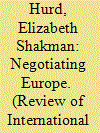

|
|
|
|
|
| Publication |
2006.
|
| Summary/Abstract |
This article examines the cultural basis of European opposition to Turkish accession to the European Union (EU). Most observers depict the cultural and religious dimensions of the European debate over Turkish accession as a disagreement between those who see Europe as a Christian 'club' and those open to a more religiously pluralistic European identity. However, polls suggest that cultural and religiously based doubts about Turkish accession resonate with a much larger proportion of the European population than those who publicly defend the idea of an exclusivist 'Christian' Europe. Both secularists and Christian exclusivists ('traditionalists') express hesitations about Turkish membership:
|
|
|
|
|
|
|
|
|
|
|
|
|
|
|
|
| 6 |
ID:
073682


|
|
|
|
|
| Publication |
2006.
|
| Summary/Abstract |
Legitimacy is currently a salient topic in the International Relations (IR) literature. In an era of globalisation, discrepancies have emerged between political ideals and the realities of the global distribution of power. One significant aspect of this debate concerns the role and influence of transnational non-governmental organisations (NGOs). This article examines the issue of transnational NGOs' legitimacy in international society. It is suggested that accusations of NGOs' 'illegitimacy' often rest on a comparison between 'legitimate' state power sanctioned by liberal democratic norms, and 'illegitimate' non-state power. More pressing than the fact of non-governmental sector's 'non-state' character, however, is the question of how to put effective limits on power per se in international society.
|
|
|
|
|
|
|
|
|
|
|
|
|
|
|
|
| 7 |
ID:
073687


|
|
|
|
|
| Publication |
2006.
|
| Summary/Abstract |
The central argument of this article is that Theodore Roosevelt's worldview was formed at the intersection of geopolitics and cosmopolitan morality. The intellectual roots of his political and foreign policy convictions contributed to a diplomatic style for which the conventional labels of realism or idealism are both inadequate and misleading. Contrary to the stereotypical caricature of Roosevelt as an American architect of realpolitik, or ruthless man on horseback, he held a complex set of beliefs about international relations that transcends familiar academic theorising about either power politics or universal principles of morality. Neither the vision of international anarchy, nor the calculation of state capabilities, do justice to Roosevelt's sense of the interplay between values and power in foreign policy conduct. Moral principles, Roosevelt claimed, help make clear the inescapable tension between ideals and reality. The moral problem persists, he thought, because foreign policy involves political choices obscured by faulty perception, controlled by national interests, and complicated by multiple purposes and goals. Roosevelt's more nuanced worldview underscores the need for a revised historiography of international relations, one that builds upon the recognition that realists and idealists were never divided into clearly-identifiable camps either before or after the First World War.
|
|
|
|
|
|
|
|
|
|
|
|
|
|
|
|
| 8 |
ID:
073679
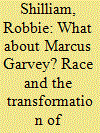

|
|
|
|
|
| Publication |
2006.
|
| Summary/Abstract |
Post World War I, Marcus Garvey's Pan-African movement managed to coalesce, however briefly and imperfectly, an extra-territorial sovereign authority in the form of the Universal Negro Improvement Association (UNIA). Through the recollection of this project the article seeks to disturb the predominant uni-linear narrative in IR debates of the transformation of sovereignty that posit a recent shift from territorial exclusivity to multi-level governance encapsulated in the emergence of the European Union. By narrating a string of transformations of sovereignty that led to Garvey's UNIA the case is made that such transformations have not directly followed one universal logic but have been multi-linear in character, and further, extra-territoriality has been a defining principle of sovereignty in the modern epoch and by no means peculiar to the contemporary European milieu. Through exploring the generative relationship between capitalist, nationalist and racialist forms of sovereignty the article contributes theoretically and empirically to a historical sociology adequate to capture the multiple, yet related, transformations of sovereignty in the modern epoch.
|
|
|
|
|
|
|
|
|
|
|
|
|
|
|
|
| 9 |
ID:
073685
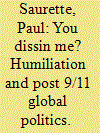

|
|
|
|
|
| Publication |
2006.
|
| Summary/Abstract |
Despite a growing awareness about the importance of emotions to global politics, the discipline of International Relations is still working towards adequate theorisations and investigations of their role. This is particularly noticeable in the fact that there has been little sustained, scholarly examination of the effects of various emotions on the shape and orientation of the US foreign policy reaction to 9/11. This essay seeks to begin to address both of these gaps by examining the role that dynamics of humiliation and counter-humiliation have played in contemporary global politics. In particular, it develops a theoretical understanding of humiliation and then applies this framework to explain how dynamics of humiliation have impacted post 9/11 American global policy. It concludes that we cannot fully understand the sources, and the effects, of post 9/11 contemporary politics (especially US global policy) without taking into account the dynamics of humiliation.
|
|
|
|
|
|
|
|
|
|
|
|
|
|
|
|
|
|
|
|
|